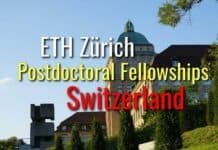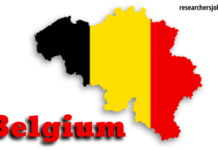Postdoctoral Researcher at University of Reading: The University of Reading is seeking a Postdoctoral Researcher to join their project focused on forecasting clear-air turbulence using hydrodynamic instability diagnostics. The goal is to improve operational forecasts for clear-air turbulence, enhancing aviation safety and efficiency. The successful candidate will have a strong background in atmospheric science or a related field, excellent scientific analytical and computing skills, and experience in working with large and complex datasets.
Designation: Postdoctoral Researcher
Research Area: Atmospheric science or a closely related subject (e.g., physics, mathematics)
Location: Whiteknights Reading UK
Eligibility/Qualification:
- A PhD in atmospheric science or a closely related subject (e.g., physics, mathematics), or equivalent research experience
- Strong scientific analytical and computing skills
- Experience in analyzing, manipulating, and visualizing large and complex datasets
- Effective communication skills, both verbal and written
Job Description: The Postdoctoral Researcher will contribute to a project that aims to enhance clear-air turbulence forecasting by developing and testing new nonlocal diagnostics for hydrodynamic instability. The role involves analyzing data, developing predictive models, and improving operational forecasts for clear-air turbulence in the aviation sector. The goal is to make flying smoother, safer, and more environmentally friendly. The researcher will work closely with the project team and collaborate with stakeholders in the aviation industry.
How to Apply: Interested candidates should review the job description and personal specification for further details. To apply, please send your application to the provided contact email, including a cover letter, curriculum vitae, and any relevant supporting documents. Applications from candidates requiring sponsorship to work in the UK will be considered. The University of Reading is committed to diversity, equality, and inclusivity and welcomes applications for job-share, part-time, and flexible working arrangements.
Last Date for Apply: The closing date for applications is 31 July 2023.
Table 1: Research Area
| Research Area |
|---|
| Clear-Air Turbulence, Atmospheric Science, Hydrodynamic Instability |
Table 2: Eligibility/Qualification
| Eligibility/Qualification |
|---|
| A PhD in atmospheric science or a closely related subject (e.g., physics, mathematics), or equivalent research experience |
| Strong scientific analytical and computing skills |
| Experience in analyzing, manipulating, and visualizing large and complex datasets |
| Effective communication skills, both verbal and written |
Table 3: Job Description
| Responsibilities |
|---|
| Contribute to the project focused on forecasting clear-air turbulence using hydrodynamic instability diagnostics |
| Analyze data, develop predictive models, and improve operational forecasts for clear-air turbulence in the aviation sector |
| Collaborate with the project team and stakeholders in the aviation industry |
| Work closely with the research group and contribute to enhancing aviation safety and efficiency |
Table 4: How to Apply
| Application Process |
|---|
| Send application to the provided contact email |
| Include a cover letter, curriculum vitae, and supporting documents |
Table 5: Last Date for Apply
| Last Date for Apply |
|---|
| July 31, 2023 |
Table 6: Location
| Location |
|---|
| Whiteknights Reading UK |
Table 7: Contact
| Contact |
|---|
| Contact name: Paul Williams |
| Contact email: p.d.williams@reading.ac.uk |
Table 8: Additional Information
| Additional Information |
|---|
| Applications from job seekers who require sponsorship to work in the UK are welcome and will be considered alongside all other applications. Further information on sponsorship can be found on the UK Visas and Immigration Website. The University of Reading promotes diversity and inclusion and supports job-share, part-time, and flexible working arrangements. |
Table 9: Department
| Department |
|---|
| School of Mathematical Physical & Computational Sciences |
Table 10: Division
| Division |
|---|
| Meteorology |








